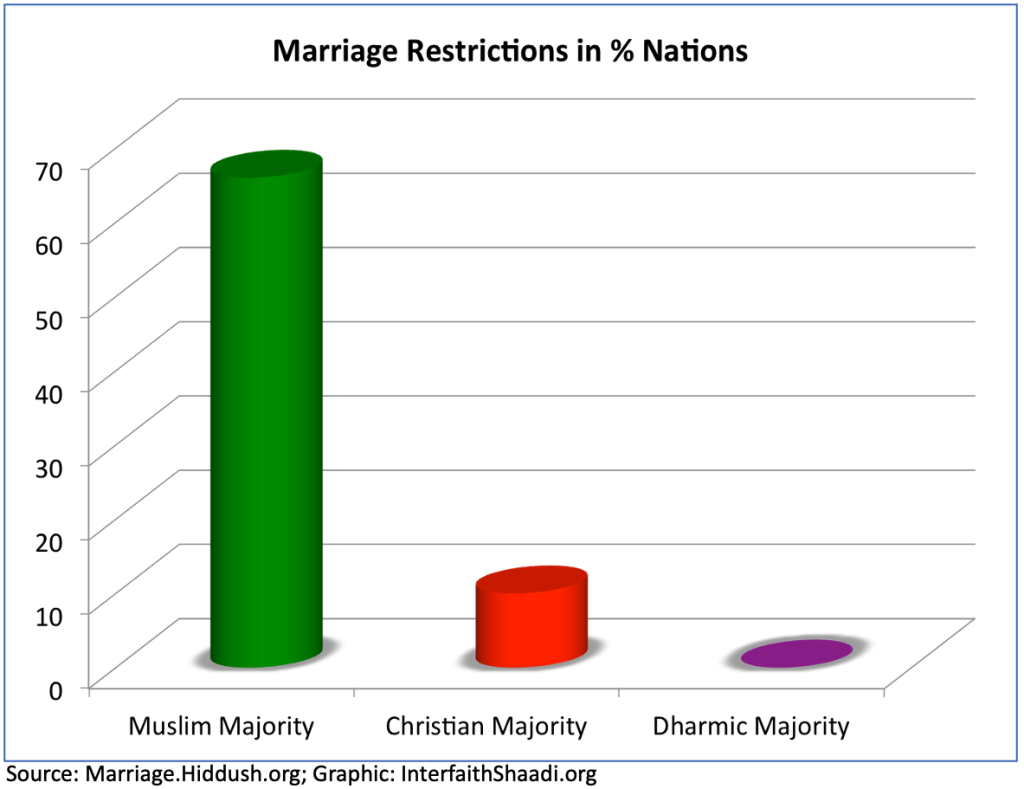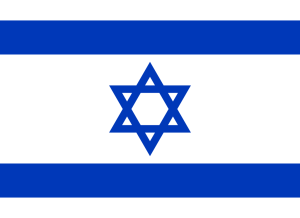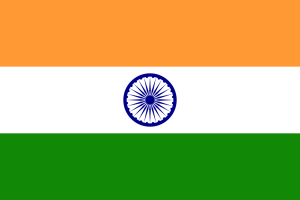JULY 7, 2022 BY DR. DILIP AMIN
Interfaith dating couples must clearly understand all applicable laws relating to marriage, divorce and child custody before committing to an interfaith marriage. Such couples may have to tackle two forms of laws:
- Religious Institutional Rules and Regulations, and
- Governmental Laws.
With interfaith marriages becoming more and more prevalent, the legal and cultural complexity of this emerging phenomenon has taken up new dimensions in a world which continues to remain polarized by religions.
Many Americans may regard religious freedom to be a norm but unaware that many religious institutes could impose severe restrictions on your planned interfaith marriage. Further, using marriage as a tool, many foreign governments impose their religious ideologies negatively impacting minorities.

Photo: Joe Gratz/Wipimedia
Religious Institutional Rules and Regulations
Almost all religious institutions have strict codes regarding interfaith marriages.
For most times in the Dharmic faiths (Hinduism, Buddhism, Jainism and Sikhism), marriage is often considered a personal and familial choice and might lie outside the fringes of religious institutional diktat. So, asking someone to change religion in order to facilitate the religious ritual of marriage or to please a religious institution is not a common practice in the Dharmic faiths.
In some Christian denominations, such as Catholics, the non-Catholic party may be required to convert or sign a prenuptial agreement stating the off-springs of the couple would be to be raised as Catholics. Some churches might excommunicate such parents, and even deprive them of their rights to perform last rites of their parents (Tejas’ experience).
In Islam, a Hindu-Muslim marriage would be considered an act of damnation unless the Hindu converted to Islam before the Islamic nikaah wedding. Nikaah with other Abrahamic (“People of the Book”) may be possible without conversion on condition that the Christian-Muslim and Jewish-Muslim children be raised in the Islamic faith alone.
The author personally talked to about 10 rabbis and all of them stated that the children of Hindu-Jewish couples must be raised in Judaism only, but the children will “respect” Hinduism. One rabbi clarified the later statement using an analogy—their home would be Judaism, Hinduism will be a guest in that home.
What one has to be wary of are the legal traps set by the formal religious conversion, even fake ones, just for the sake of getting married to one’s beloved. In the event of a divorce, the conversion or any signed prenuptial agreement may have serious legal consequences, especially during a child custody battle.
Governmental Laws
In the west, and in most countries with a Christian majority, only secular laws apply to all marriages and divorces. In most Muslim majority countries, however, laws based on Islamic Sharia are employed. In India, complex marriage laws are designed due to pluralistic views of the majority and to appease people of different religions.
According to a Freedom and Marriage survey, carried out by Hiddush, a prestigious US based educational and advocacy Israel-Diaspora partnership, “severe marriage restrictions” were in place in Israel. Similar severe marriage restrictions were also present in most Muslim majority nations (62%, 33/53; “freedom of marriage” in only 6%, 3/53). A few Christian (7%, 8/120) majority nations, but no Hindu/Buddhist (0%, 0/14) majority nations, had such severe restrictions.

This article endeavours to bring under one umbrella the various marriage and divorce laws as practised around the globe. A few countries have been selected as representatives of different religions or regions and to show legal approach towards these very important facets of life:
- United Kingdom, as representative of western laws,
- Israel, as a Jewish state,
- Malaysia, as a moderate and secular country with a Muslim majority, and
- India, as a pluralistic society with a complex approach to marriage and divorce (Read more on these and other countries here)
Please note that the information presented here is for educational purposes only. An interfaith couple must explore all laws applicable in their country of residence. One should not take this information as legal advice but instead consult with an attorney with expertise in interfaith marriages.
Western Marriage and Divorce Laws

Marriage between people in the UK is governed by Marriage Act 1949 and Marriage Causes Act 1973. As far as the British law is concerned the couple needs only to be of an appropriate age and have the capacity to marry. Religion is not a limiting factor. In short, interfaith marriage is permissible in the UK and conversion to another faith is more of a personal choice. This same freedom is also guaranteed through the European Convention of Human Rights.
Israel Marriage Laws

Israeli law permits only religious marriages held by religious testimony and does not allow civil marriages. Among the Jewish population, the Chief Rabbinate, which operates according to Orthodox Jewish standards, has a monopoly in conducting marriages. Only those who are recognized as Jews according to Orthodox Jewish law can get married in Israel. Members belonging to other religions can only marry spouses of the same religion and only by their own recognized religious authority. The result is that no interfaith or non-religious marriages are allowed in Israel. However, the Ministry of Interior registers and accepts civil marriages held abroad.
Malaysian Marriage Laws

The Malaysian constitution grants freedom of religion and makes it an officially secular state, while establishing Islam as the “religion of the Federation” to symbolize its importance to Malaysian society. As defined by the Constitution of Malaysia, Malays must be Muslim, regardless of their ethnic heritage; otherwise, legally, they are not Malay.
Interfaith love with a Malay is one of the most popular themes with 96 posts at the author’s forum InterfaithShaadi. The question raised below by Sameer is a typical one posed by the youths.
Sameer says:
“My fiancée is a Chinese Malaysian (non-Muslim) and I am (non-Malaysian) Muslim. I don’t want my fiancée to convert (to Islam). What are our chances to marry in Singapore (where secular marriages are possible) and apply for a long-term visa in Malaysia? What will happen if I say I am not a Muslim?”
It gave the author great pain to disclose to these innocent lovers that the only option available to them is to 1) give up this love relationship or 2) for the non-Muslim intended spouse to convert to Islam, if they want to settle in Malaysia.
Let’s look at Malaysian marriage laws to understand the complexity an interfaith couple will face.
In Malaysia, the Federal Constitution is supreme, and the freedom of religion is something that is guaranteed by the constitution under Article 11. When it comes to Family Law (namely marriage), there are two primary statutes, the Law Reform (marriage and divorce) Act 1976 (Civil Marriage) and the Islamic Family Law (Federal Territories) Act 1984 (Muslim Marriage).
The Civil Marriage Act of 1976 Act 164 specifically states, “This Act shall not apply to a Muslim.” Hence, in Malaysia there is no means for a Muslim to marry a non-Muslim under the Civil law. In fact, the Muslim who goes through a marriage or even cohabits with non-Muslim runs the risk of falling foul of a number of offences under State Syariah (the Malay spelling of “Sharia”) Criminal Law prohibiting fornication (zina) and close proximity (khalwat). (US Dept. of State, Dr. Zakir Naik, PBS: Punishment for dating, Loyarburok)
A Muslim must register his/her marriage under Islamic Family Law Act 1984. A marriage between Muslims and non-Muslims is prohibited under Islamic law, except in some certain limited circumstances. No Muslim man shall marry a non-Muslim except a Kitabiyah and no Muslim woman shall marry a non-Muslim. (Koran 2:221; the Malaysian Islamic Family Law (Federal Territories) Act 1984 – Section 10).
A Muslim Man is allowed to marry a Kitabayah (People of the Book). A Kitabayah is a Christian woman whose ancestors were Christians before the prophethood of the Prophet Mohammad; or a Jewess whose ancestors were Jews before the prophethood of Jesus.
With many other restrictions in place, in most cases, the non-Muslim must convert to Islam to register a marriage with a Muslim in Malaysia.
It is said that there is no compulsion in Islam (Koran 2:256), but here in all practical senses, interfaith couples must know that there is a compulsion to convert or give up the love affair after having invested years of commitment into the relationship.
Malaysian citizens are given an identity card (MyKad), wherein a Muslims’ MyKad would indicate religion as “Islam.” As stated above a Muslim can only marry a Muslim; this means the non-Muslim spouse will have to convert and make appropriate adjustment in MyKad.
A marriage registered under the laws of a foreign country must be re-registered at the Malaysian Representative Office within 6 months of the date of marriage. An interfaith couple married outside Malaysia will not be able to register their matrimonial status in Malaysia and their children will be denied the benefit of Malaysian citizenship.
If a Muslim/non-Muslim couple, who having married overseas, return or go to Malaysia, and someone calls the authorities on them, the Syariah authority will likely arrest the Muslim partner for having committed zina and khalwat (since the marriage is not recognized in Malaysia).
Parallel to the civil courts, there are Syariah Courts that conduct legal matters related to affairs of the Muslim families. Legal issues like divorce and apostasy are conducted in the Syariah Courts. Syariah laws do not apply to non-Muslims.
It is important for an interfaith dating person to know that conversion to Islam may be a one-way street (potential punishment for leaving Islam is death, Bukhari 9.84.57).
It is impossible to convert to any other faith for a Muslim in most Islamic countries. It is even impossible to change a name in MyKad for a non-Muslim in Malaysia (read practising Hindu Revathi Massosai’s case).
Miss Revathi Massosai was born to Muslim converts and given a Muslim name. However, she was raised a Hindu by her grandmother and has always practised Hindu faith. However, under Malaysia’s Islamic law, having Muslim parents makes one a Muslim and, as such, one is not allowed to change one’s faith or marry a non-Muslim. But Miss Massosai married a Hindu man in 2004 and the couple had a young daughter.
In January of 2007, she filed a petition to a court to officially designate her as a Hindu. Not only was she detained, but also taken to an Islamic rehabilitation centre. She was detained for a year, during which time religious officials tried to make her pray as a Muslim and wear a headscarf. She however remained adamant and refused to surrender her faith as a Hindu. In the meantime, Miss Revathi and her daughter were placed in the custody of her Muslim parents.
A person having a Muslim registered name but practising another faith has no right to marry but in Islam (read Zarinah’s case where a practising Hindu girl was arrested for marrying a Hindu man).
Zarinah had Hindu father and mother. Later the father converted to Islam and changed children’s name to suit the Islamic tradition. But, in all practical matters Zarinah was raised a Hindu. So, when she decided to marry her Hindu lover, Malaysian police came and arrested her in the middle of the Hindu wedding. Zarinah said there was a possibility that she could be charged with insulting Islam if the issue was not resolved quickly.
Even after years of practising another faith, the Syariah Police will enforce that a former Muslim (even though she/he may be practising another faith for most of one’s later life) be given only Muslim final rites (read Mr. Moorthy case where a practising Hindu man’s body was taken away from his Hindu wife).
M Moorthy, a Malaysian mountaineering hero was buried as a Muslim, against the wishes of his Hindu wife, who denied he had converted to Islam before his death. The decision follows a Malaysian High Court ruling that it cannot override the country’s Islamic Courts in matters of religious conversion. An Islamic Syariah Court subsequently upheld a claim by his former colleagues in the army that he had become a Muslim last year. However, his family, who wanted him to have a Hindu funeral, was not allowed to appear before the court to dispute his conversion since they were not Muslims. The family went to the civil court and argued that Mr. Moorthy was a practising Hindu. As early as two months prior to his passing, he was even interviewed for a local television channel on his preparations for the Hindu festival of Diwali. Despite the fact that the family presented all the requisite proof of Mr. Moorthy being a Hindu, the High Court agreed with the government lawyers, who in turn argued that the Civil Court had no jurisdiction.
It is high time that the Malay government do more to educate the non-Muslim and Muslim youths alike on the serious consequences of interfaith love.
One should expect lots more serious marriage restrictions in the Middle East. You will not get a travel visa as a secular married couple (when one being a Muslim) to go to Iran and child custody could be an even more serious issue. The U.S. citizen Betty Mahmoody’s travels in Iran, as described in her bestseller book Not Without My Daughter, is a case in point.
To the best of the author’s knowledge, there is no Christian or Hindu/Buddhist majority country that has made interfaith marriage laws which favors only the majority. Even Israel has a loophole which acknowledges and gives legitimacy to the wedlock performed abroad.
The author is of the opinion that Muslim majority countries apply interfaith marriage laws favoring Islam only and are unfair and unjust to all other minorities.
Indian Marriage and Divorce Laws

India has a dual system of matrimonial laws. Personal laws ordinarily govern various communities or groups of communities, although individuals can opt out of the community-specific family-law regime and voluntarily subject themselves to the national laws on civil marriages.
Information here is a summary based on material found at Legalight.in, SudhirLaw, Wikipedia, Indiankanoon.org and other sources. Information presented here is for educational purposes only. Interfaith couples should check with an attorney for legal consultation in their own country.
Indian personal marriage laws:
Hindus (includes Jain, Sikh, Buddhist) are governed by the Hindu Marriage Act, 1955. (Indian Kanoon, Wikipedia) Each of the parties shall belong to and profess the Hindu (Jain, Sikh, Buddhist) faith or religion. Sikh couples may be able to get their marriages registered under the Anand Marriage 1909 Act (amended in 2012) instead of the Hindu Marriage Act.
Muslims are governed by their personal laws under which nikaah (i.e. marriage) is a contract and may be permanent or temporary permitting a man to have four wives if he treats them all with equality. To have a valid nikaah under the Muslim Law, presence of a kazi (priest or judge) is not necessary. Merely a proposal in the presence and hearing of two sane males or one sane male and two sane female adults (all belonging to the Islamic faith) and acceptance of the said proposals at the same time constitutes a valid “nikaah.” “Triple Talaq” (Talaq-e-Biddat) allowed a Muslim husband to divorce his wife by repeating the word “talaq” (divorce) three times in any form, including email or text message. This type of talak is now illegal in India since 2019.
Parsees (Zoroastrians) are governed under the Parsee Marriage & Divorce Act, 1936 which outlines the provisions of their marriage and law.
Christians are governed by the Indian Christian Marriage Act, 1872. If one party thereto alone is of a Christian faith, such a marriage becomes valid only if the personal law of the non-Christian party treats such marriage as valid. Where the wife is a Christian woman and the husband is a Hindu man, there is no prohibition under Hindu law for such a marriage. Where one of the parties to a marriage in India is a Christian and the other party is a non-Christian the best course to adopt is to solemnize the marriage under the Special Marriage Act, 1954.
Indian civil marriages:
Persons of any religion (Hindu, Muslim, Christian or Parsee) who get married under the Special Marriage Act, 1954 (also called “Civil Marriage”) are governed by the said act.
Special Marriage Act, 1954 (General Marriage Law):
The Special Marriage Act, 1954 provides for a special form of marriage in certain cases and for the registration of such and certain other marriages and has provision for divorce available to all citizens of India married under the Act. A marriage between any two persons (Muslim, Christian, Hindu and others) may be solemnized after giving notice thereof under the Act. After the marriage has been solemnized, the Marriage Officer shall enter a certificate thereof and the parties to the marriage and three witnesses shall sign the certificate of marriage.
The effect of registration of Marriage is that all children born after the date of ceremony of marriage shall in all respects be deemed to be the legitimate children of their parents. The marriage of any member of an undivided family belonging to Hindu, Buddhist, Sikh or Jain religion, solemnized under this Act shall be deemed to affect his severance from the family. The Act provides for remedies like restitution of conjugal rights, judicial separation, nullity of marriage and divorce. There is a provision made in the Act for the grant of alimony pendente-lite and permanent alimony to the wife.
Multiple marriage ceremonies in India:
Sometimes a couple goes through multiple marriage ceremonies to please two sets of parents or for personal preferences. Legally, only the first registered marriage ceremony and laws relating to it will apply to that marriage.
Interfaith dating youths must do their homework and fully understand all the legal and other consequences of their actions.
Summary
Interfaith couples may face opposition from religious institutional rules and governmental laws. The formal religious conversion (even fake-conversion) just for the marriage or signing of any prenuptial religious agreement may have serious legal consequences, especially during a child custody battle in the event of a divorce. Interfaith dating couples must clearly understand all laws applicable to marriage, divorce and child custody before committing to an interfaith marriage.
@@@
Probably this is the first such comprehensive article covering international laws pertaining to interfaith marriages. It shows pluralism or exclusivism in practice in different countries, that is influenced by local religion(s).
During the past 17 years, the author has guided 1200 youths in love relationships from all over the world. This includes more than 70 couples with some connection to Malaysia. In most of these cases, the couple decided to get married without giving any serious thought to applicable local marriage laws. It was very painful for the author to disclose to those innocent love-birds the upcoming potential issues they may face from religious institutional practices and national laws. It is hoped that youths in love will think through all potential situations before going deeper into their relationship.
The author is a lifelong medical scientist and not a law professional. The author would highly appreciate your feedback on contents in the article to improve for the future.
Also read Hindu-Muslim marriage laws in India here https://hindupost.in/society-culture/what-every-hindu-girl-marrying-a-muslim-should-know-marriage-laws-in-bharat/


Hi, how do you convert a civil marriage (in UK) to Muslim marriage in Singapore? We tried to register in Registry of Muslim Marriage website but it requires a marital status letter that shows ‘single’. We got married the civil way due to his parents health and have always wanted to do a Muslim one a year later (for my family as I am a Muslim) but now it seems complicated. I’ve tried contacting the Registry and researching but no one seems an answer or have the same problem. If anyone have any answers, please share. Thank you.
Reply at https://interfaithshaadi.org/how-do-you-convert-a-civil-marriage-in-uk-to-muslim-marriage-in-singapore/